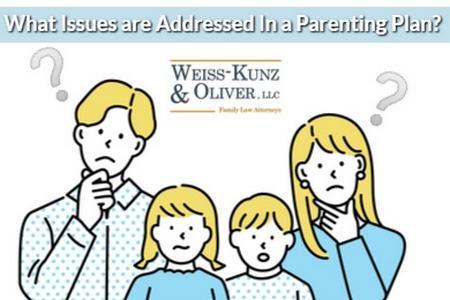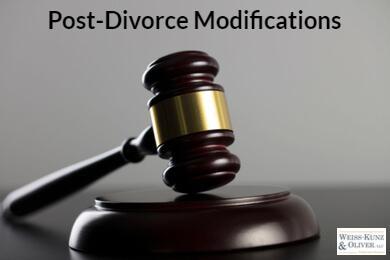116 N. York Street, 3rd Floor, Elmhurst, IL 60126
 312-605-4041
312-605-4041
Recent Blog Posts
What Issues Will a Parenting Plan Address During an Illinois Divorce?
 Most divorce cases involve a variety of complex legal issues and financial concerns. However, cases in which a couple has children can often become even more complicated. In addition to addressing their individual desires and financial needs, parents will need to determine how to handle child custody going forward. Since divorcing spouses will often disagree about these issues, they may need to resolve contentious disputes. Each parent will likely be concerned about where their children will live, when the children will be able to spend time with them, and how they will make decisions about how children will be raised. During their divorce, spouses will need to create a parenting plan that fully details the decisions made regarding these issues.
Most divorce cases involve a variety of complex legal issues and financial concerns. However, cases in which a couple has children can often become even more complicated. In addition to addressing their individual desires and financial needs, parents will need to determine how to handle child custody going forward. Since divorcing spouses will often disagree about these issues, they may need to resolve contentious disputes. Each parent will likely be concerned about where their children will live, when the children will be able to spend time with them, and how they will make decisions about how children will be raised. During their divorce, spouses will need to create a parenting plan that fully details the decisions made regarding these issues.
Matters related to your children are some of the most important issues that you will need to deal with during your divorce. To make sure you are making the right decisions and taking the correct steps to protect your parental rights and provide for your children's needs, you can work with a skilled and experienced family law attorney. At the law firm of Weiss-Kunz & Oliver, LLC, we provide our clients with strong representation, ensuring that they are fully prepared to address child-related issues correctly during the divorce process. We will work with you to make sure your parenting plan will meet your family's needs and protect your children's best interests.
How Is the Division of Property Handled in an Illinois Divorce?
 Getting a divorce will require you to address many different legal issues, and figuring out how you and your spouse will separate your lives from each other can often be a complex process. Determining how to approach the division of marital property is not always easy, but by understanding how the laws apply in your case, you can make decisions that will protect your rights and financial interests, allow you to benefit from the effort you put into your marriage, and provide you with the resources you need to succeed as you move forward with your life.
Getting a divorce will require you to address many different legal issues, and figuring out how you and your spouse will separate your lives from each other can often be a complex process. Determining how to approach the division of marital property is not always easy, but by understanding how the laws apply in your case, you can make decisions that will protect your rights and financial interests, allow you to benefit from the effort you put into your marriage, and provide you with the resources you need to succeed as you move forward with your life.
During the divorce process, you can make sure you are taking the right steps to address property division by working with an experienced attorney. The lawyers of Weiss-Kunz & Oliver, LLC provide our clients with knowledge and understanding of how the divorce laws in Illinois apply to them and how disagreements between spouses can be resolved. Whether you need to address valuable assets during a high net worth divorce or are looking to negotiate a property settlement during an uncontested divorce, we can advocate for your interests and advise you on how to resolve disputes successfully and finalize your divorce as quickly and efficiently as possible.
When Can I Make Modifications to My Divorce Decree or Judgment?
 Legally ending a marriage is a complex process, and couples will need to address many different issues as they work to complete their divorce. Once the divorce process is complete, spouses will usually be ready to move forward from this difficult time and begin the next stage of their lives. However, some ex-spouses may experience changes in their lives that affect the terms of their divorce decree, or they may uncover issues that they believe were handled incorrectly during their divorce. In certain cases, an ex-spouse may petition for modifications of their divorce decree or judgment, and a person may also need to take action to enforce the terms of their divorce.
Legally ending a marriage is a complex process, and couples will need to address many different issues as they work to complete their divorce. Once the divorce process is complete, spouses will usually be ready to move forward from this difficult time and begin the next stage of their lives. However, some ex-spouses may experience changes in their lives that affect the terms of their divorce decree, or they may uncover issues that they believe were handled incorrectly during their divorce. In certain cases, an ex-spouse may petition for modifications of their divorce decree or judgment, and a person may also need to take action to enforce the terms of their divorce.
While there are many situations where a person may feel that post-divorce modifications are necessary, they will need to meet certain requirements to show that these types of modifications should be made. By understanding how the laws in Illinois apply in these situations, an ex-spouse can make sure they take the correct steps to successfully petition for changes to their divorce decree. At Weiss-Kunz & Oliver, LLC, we work with our clients to help them determine whether they qualify for post-divorce modifications, and we provide representation when addressing these matters in the courtroom. If you believe that a modification is needed, we can help you prepare and file a petition, assist in negotiating an agreement with your ex-spouse, and advocate on your behalf during legal proceedings.
What Are the Options for Resolving Disputes in a Contested Divorce?
 A divorce will involve many different issues that will need to be addressed before a couple's marriage can be legally dissolved. In some cases, couples will be looking to pursue an uncontested divorce in which they will resolve these issues outside of court, create a divorce settlement that fully details the decisions made, and complete their divorce by attending a “prove-up” hearing. However, it is likely that couples will encounter disagreements about some of these issues, and they may struggle to resolve these disputes on their own. In a contested divorce case, a person will want to understand their options for addressing these issues.
A divorce will involve many different issues that will need to be addressed before a couple's marriage can be legally dissolved. In some cases, couples will be looking to pursue an uncontested divorce in which they will resolve these issues outside of court, create a divorce settlement that fully details the decisions made, and complete their divorce by attending a “prove-up” hearing. However, it is likely that couples will encounter disagreements about some of these issues, and they may struggle to resolve these disputes on their own. In a contested divorce case, a person will want to understand their options for addressing these issues.
At Weiss-Kunz & Oliver, LLC, we know the difficulties that divorcing spouses can encounter as they determine how to proceed with ending their marriage. We are dedicated to helping our clients find effective solutions that will allow them to complete the divorce process as efficiently as possible and move forward with their lives. For those who have encountered disputes that seem difficult to resolve, we work to help them determine the best course of action. We make sure our clients know their options at all times, and we provide strong legal representation to ensure that their rights and interests will be protected.
What Divorced or Separated Parents Need to Know About Child Tax Credits
 Of the many complex financial issues that spouses may need to address during the divorce process, tax considerations can be among the most confusing. These issues can be a major concern for parents since the ability to claim children as dependents can affect the amount of taxes that a person will pay, the tax credits they can claim, and the tax refunds they will receive when filing their annual tax returns. Parents will need to be sure to understand how to address child-related tax issues both during the divorce process and after their divorce is complete. They will also need to understand how they will be affected by changes in tax laws, including the ability to receive advance child tax credits.
Of the many complex financial issues that spouses may need to address during the divorce process, tax considerations can be among the most confusing. These issues can be a major concern for parents since the ability to claim children as dependents can affect the amount of taxes that a person will pay, the tax credits they can claim, and the tax refunds they will receive when filing their annual tax returns. Parents will need to be sure to understand how to address child-related tax issues both during the divorce process and after their divorce is complete. They will also need to understand how they will be affected by changes in tax laws, including the ability to receive advance child tax credits.
Advance Child Tax Credits for 2021
The American Rescue Plan Act, which was signed into law in March of 2021, allows parents to receive advance payments during the year for child tax credits that will be claimed on their tax returns for that year. For 2021, the child tax credit is $3,000 for a child under the age of 18 or $3,600 for a child under the age of six. Parents may receive monthly payments from the IRS between July and December of 2021, adding up to half of the total amount of the child tax credit. The remaining amount may be claimed on the parent's tax return for 2021.
What You Need to Know About Spousal Support During Your Illinois Divorce

Out of the different types of financial matters that couples will need to address during a divorce, spousal support can often be one of the most contentious issues. While parents will usually recognize that child support will be necessary to provide for their children's needs, and couples understand that they will need to divide their marital property fairly and equitably, a spouse may be unhappy about the requirement to make ongoing payments to their former partner. However, there are situations where this form of support may be necessary, and it is important for spouses to understand how the laws that address this issue will apply in their case.
When addressing matters related to spousal support and other financial issues during your divorce, you can improve your chances of achieving a positive outcome by working with an experienced divorce attorney. Your lawyer can explain your rights and ensure that all financial factors in your case are considered properly, and they can act as your legal advocate, making sure your rights and interests will be protected in the decisions that are made.
How is Child Custody Handled in an Illinois Divorce Case?
 When divorcing spouses share children, the divorce process is much more complex – legally, financially, and personally. If you are a parent getting a divorce in Illinois, it is essential to know what to expect. By educating yourself on child custody concerns, you can prepare for these concerns in advance. The better prepared you are, the better position you will be in to make the decisions that are right for you and your family.
When divorcing spouses share children, the divorce process is much more complex – legally, financially, and personally. If you are a parent getting a divorce in Illinois, it is essential to know what to expect. By educating yourself on child custody concerns, you can prepare for these concerns in advance. The better prepared you are, the better position you will be in to make the decisions that are right for you and your family.
For help, contact a skilled divorce lawyer who understands the unique challenges parents face during divorce and how to meet these challenges head-on. Getting divorced as a parent can seem overwhelming and intimidating, but you do not have to face this situation alone. An experienced attorney can protect your rights, explore your options with you, and help you take the legal steps necessary to accomplish your child custody goals.
Clearing Up Common Misconceptions About Prenuptial Agreements in Illinois

Prenuptial agreements: Are any other legal documents subject to more controversy and misunderstanding? Prenuptial agreements, also called premarital agreements or “prenups,” are legal contracts that a couple signs before getting married. Many people grossly misunderstand the purpose of a prenuptial agreement. They assume that only couples who do not believe in the longevity of their marriage would sign a prenuptial agreement or that prenups are only used by wealthy husbands to prevent their wives from pocketing their wealth.
In reality, drafting a mutually beneficial prenuptial agreement is one of the most responsible and practical steps you can take before getting married. Prenups serve a wide range of purposes, including protecting both spouses' property rights, avoiding stressful litigation in the event of divorce, and describing how property should be distributed if a spouse passes away.
How To Handle Hidden Assets and Other Forms of Financial Deception During an Illinois Divorce
 Although we rarely think of marriage in these terms, spouses who get married enter into a financial partnership with each other. Consequently, a marriage represents much more than the romantic or personal connection between spouses. It also represents a melding of the spouses' finances. Per Illinois law, spouses are entitled to an equitable portion of the marital estate during divorce. Unfortunately, the process of allocating marital property between spouses in a divorce becomes much more complicated when a spouse lies about finances.
Although we rarely think of marriage in these terms, spouses who get married enter into a financial partnership with each other. Consequently, a marriage represents much more than the romantic or personal connection between spouses. It also represents a melding of the spouses' finances. Per Illinois law, spouses are entitled to an equitable portion of the marital estate during divorce. Unfortunately, the process of allocating marital property between spouses in a divorce becomes much more complicated when a spouse lies about finances.
If you are getting divorced, it is essential to understand your rights regarding the division of marital property, child support, spousal maintenance, and other divorce issues. If you suspect that your spouse is lying about finances or may attempt to hide assets during your divorce, contact a divorce attorney for help right away.
What You Need to Know When Divorcing a Narcissist
 Getting a divorce is rarely easy, especially in contentious cases involving high levels of conflict between spouses. It is understandable that spouses may not see eye to eye during the divorce process, and disagreements can be expected in most cases. However, there are some cases where a spouse may behave unreasonably and have unrealistic expectations about what should happen during the divorce process. Unfortunately, those who are getting divorced from a spouse with mental health issues will often experience difficult conflicts, and this is especially true when a spouse is a narcissist.
Getting a divorce is rarely easy, especially in contentious cases involving high levels of conflict between spouses. It is understandable that spouses may not see eye to eye during the divorce process, and disagreements can be expected in most cases. However, there are some cases where a spouse may behave unreasonably and have unrealistic expectations about what should happen during the divorce process. Unfortunately, those who are getting divorced from a spouse with mental health issues will often experience difficult conflicts, and this is especially true when a spouse is a narcissist.
Divorces involving mental illness and concerns about the health and safety of the parties and their family members can become complex very quickly. If you believe that your spouse is a narcissist, you may need to prepare to address multiple types of conflicts and legal issues, and you will want to take steps to protect your rights and determine your best options for resolving disputes successfully. Having the right attorney on your side during this process is crucial. A lawyer who is experienced in high-conflict divorce cases can advise you of your options and provide you with skilled representation when addressing issues in the courtroom.




















